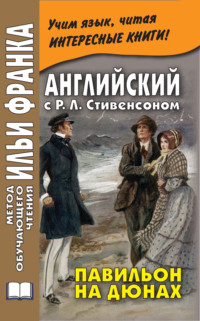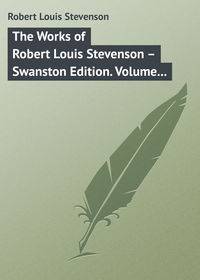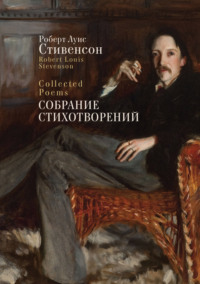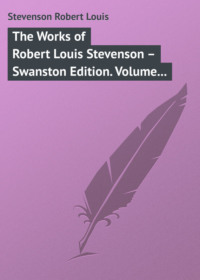 полная версия
полная версияThe Works of Robert Louis Stevenson – Swanston Edition. Volume 24
You said nothing about my subject for a poem. Don’t you like it? My own fishy eye has been fixed on it for prose, but I believe it could be thrown out finely in verse, and hence I resign and pass the hand. Twig the compliment? – Yours affectionately,
R. L. S.To W. E. Henley
“Tushery” had been a name in use between Stevenson and Mr. Henley for romances of the Ivanhoe type. He now applies it to his own tale of the Wars of the Roses, The Black Arrow, written for Mr. Henderson’s Young Folks, of which the office was in Red Lion Court.
[Hyères, May 1883.]… The influenza has busted me a good deal; I have no spring, and am headachy. So, as my good Red Lion Courier begged me for another Butcher’s Boy – I turned me to – what thinkest ’ou? – to Tushery, by the mass! Ay, friend, a whole tale of tushery. And every tusher tushes me so free, that may I be tushed if the whole thing is worth a tush. The Black Arrow: A Tale of Tunstall Forest is his name: tush! a poor thing!
Will Treasure Island proofs be coming soon, think you?
I will now make a confession. It was the sight of your maimed strength and masterfulness that begot John Silver in Treasure Island. Of course, he is not in any other quality or feature the least like you; but the idea of the maimed man, ruling and dreaded by the sound, was entirely taken from you.
Otto is, as you say, not a thing to extend my public on. It is queer and a little, little bit free; and some of the parties are immoral; and the whole thing is not a romance, nor yet a comedy; nor yet a romantic comedy; but a kind of preparation of some of the elements of all three in a glass jar. I think it is not without merit, but I am not always on the level of my argument, and some parts are false, and much of the rest is thin; it is more a triumph for myself than anything else; for I see, beyond it, better stuff. I have nine chapters ready, or almost ready, for press. My feeling would be to get it placed anywhere for as much as could be got for it, and rather in the shadow, till one saw the look of it in print. – Ever yours,
Pretty Sick.To W. E. Henley
La Solitude, Hyères-les-Palmiers, May 1883.MY DEAR LAD, – The books came some time since, but I have not had the pluck to answer: a shower of small troubles having fallen in, or troubles that may be very large.
I have had to incur a huge vague debt for cleaning sewers; our house was (of course) riddled with hidden cesspools, but that was infallible. I have the fever, and feel the duty to work very heavy on me at times; yet go it must. I have had to leave Fontainebleau, when three hours would finish it, and go full-tilt at tushery for a while. But it will come soon.
I think I can give you a good article on Hokusai; but that is for afterwards; Fontainebleau is first in hand.
By the way, my view is to give the Penny Whistles to Crane or Greenaway. But Crane, I think, is likeliest; he is a fellow who, at least, always does his best.
Shall I ever have money enough to write a play?
O dire necessity!
A word in your ear: I don’t like trying to support myself. I hate the strain and the anxiety; and when unexpected expenses are foisted on me, I feel the world is playing with false dice. – Now I must Tush, adieu.
An Aching, Fevered, Penny-Journalist.A lytle Jape of TUSHERIEBy A. Tusher.The pleasant river gushesAmong the meadows green;At home the author tushes;For him it flows unseen.The Birds among the BŭshesMay wanton on the spray;But vain for him who tushesThe brightness of the day!The frog among the rushesSits singing in the blue.By’r la’kin! but these tushesAre wearisome to do!The task entirely crushesThe spirit of the bard:God pity him who tushes —His task is very hard.The filthy gutter slushes,The clouds are full of rain,But doomed is he who tushesTo tush and tush again.At morn with his hair-brushes,Still “tush” he says, and weeps;At night again he tushes,And tushes till he sleeps.And when at length he pŭshesBeyond the river dark —’Las, to the man who tushes,“Tush,” shall be God’s remark!To Sidney Colvin
[Chalet la Solitude, Hyères, May 1883.]COLVIN, – The attempt to correspond with you is vain. Well, well, then so be it. I will from time to time write you an insulting letter, brief but monstrous harsh. I regard you in the light of a genteel impostor. Your name figures in the papers but never to a piece of letter-paper: well, well.
News. I am well: Fanny been ill but better: Otto about three-quarters done; Silverado proofs a terrible job – it is a most unequal work – new wine in old bottles – large rats, small bottles:5 as usual, penniless – O but penniless: still, with four articles in hand (say £35) and the £100 for Silverado imminent, not hopeless.
Why am I so penniless, ever, ever penniless, ever, ever penny-penny-penniless and dry?
The birds upon the thorn,The poppies in the corn,They surely are more fortunate or prudenter than I!
In Arabia, everybody is called the Father of something or other for convenience or insult’s sake. Thus you are “the Father of Prints,” or of “Bummkopferies,” or “Father of Unanswered Correspondence.” They would instantly dub Henley “the Father of Wooden Legs”; me they would denominate the “Father of Bones,” and Matthew Arnold “the Father of Eyeglasses.”
I have accepted most of the excisions. Proposed titles: —
The Innocent Muse.A Child’s Garden of Rhymes.Songs of the Playroom.Nursery Songs.I like the first?
R. L. S.To W. E. Henley
La Solitude, Hyères, May or June 1883.DEAR LAD, – Snatches in return for yours; for this little once, I’m well to windward of you.
Seventeen chapters of Otto are now drafted, and finding I was working through my voice and getting screechy, I have turned back again to rewrite the earlier part. It has, I do believe, some merit: of what order, of course, I am the last to know; and, triumph of triumphs, my wife – my wife who hates and loathes and slates my women – admits a great part of my Countess to be on the spot.
Yes, I could borrow, but it is the joy of being before the public, for once. Really, £100 is a sight more than Treasure Island is worth.
The reason of my dèche? Well, if you begin one house, have to desert it, begin another, and are eight months without doing any work, you will be in a dèche too. I am not in a dèche, however; distingue– I would fain distinguish; I am rather a swell, but not solvent. At a touch the edifice, ædificium, might collapse. If my creditors began to babble around me, I would sink with a slow strain of music into the crimson west. The difficulty in my elegant villa is to find oil, oleum, for the dam axles. But I’ve paid my rent until September; and beyond the chemist, the grocer, the baker, the doctor, the gardener, Lloyd’s teacher, and the great chief creditor Death, I can snap my fingers at all men. Why will people spring bills on you? I try to make ’em charge me at the moment; they won’t, the money goes, the debt remains. – The Required Play is in the Merry Men.
Q. E. F.I thus render honour to your flair; it came on me of a clap; I do not see it yet beyond a kind of sunset glory. But it’s there: passion, romance, the picturesque, involved: startling, simple, horrid: a sea-pink in sea-froth! S’agit de la désenterrer. “Help!” cries a buried masterpiece.
Once I see my way to the year’s end, clear, I turn to plays; till then I grind at letters; finish Otto; write, say, a couple of my Traveller’s Tales; and then, if all my ships come home, I will attack the drama in earnest. I cannot mix the skeins. Thus, though I’m morally sure there is a play in Otto, I dare not look for it: I shoot straight at the story.
As a story, a comedy, I think Otto very well constructed; the echoes are very good, all the sentiments change round, and the points of view are continually, and, I think (if you please), happily contrasted. None of it is exactly funny, but some of it is smiling.
R. L. S.To W. E. Henley
The verses alluded to are some of those afterwards collected in Underwoods.
[Chalet la Solitude, Hyères, May or June 1883.]DEAR HENLEY, – You may be surprised to hear that I am now a great writer of verses; that is, however, so. I have the mania now like my betters, and faith, if I live till I am forty, I shall have a book of rhymes like Pollock, Gosse, or whom you please. Really, I have begun to learn some of the rudiments of that trade, and have written three or four pretty enough pieces of octosyllabic nonsense, semi-serious, semi-smiling. A kind of prose Herrick, divested of the gift of verse, and you behold the Bard. But I like it.
R. L. S.To Jules Simoneau
This friend was the keeper of the inn and restaurant where Stevenson had boarded at Monterey in the autumn of 1879. In writing French, as will be seen, Stevenson had always more grip of idiom than of grammar.
[La Solitude, Hyères, May or June 1883.]MON CHER ET BON SIMONEAU, – J’ai commencé plusieurs fois de vous écrire; et voilà-t-il pas qu’un empêchement quelconque est arrivé toujours. La lettre ne part pas; et je vous laisse toujours dans le droit de soupçonner mon cœur. Mon bon ami, ne pensez pas que je vous ai oublié ou que je vous oublierai jamais. Il n’en est de rien. Votre bon souvenir me tient de bien près, et je le garderai jusqu’à la mort.
J’ai failli mourir de bien près; mais me voici bien rétabli, bien que toujours un peu chétif et malingre. J’habite, comme vous voyez, la France. Je travaille beaucoup, et je commence à ne pas être le dernier; déjà on me dispute ce que j’écris, et je n’ai pas à me plaindre de ce que l’on appelle les honoraires. Me voici alors très affairé, très heureux dans mon ménage, gâté par ma femme, habitant la plus petite maisonette dans le plus beau jardin du monde, et voyant de mes fen êtres la mer, les isles d’Hyères, et les belles collines, montagnes et forts de Toulon.
Et vous, mon très cher ami? Comment celà va-t-il? Comment vous portez-vous? Comment va le commerce? Comment aimez vous le pays? et l’enfant? et la femme? Et enfin toutes les questions possibles. Écrivez-moi donc bien vite, cher Simoneau. Et quant à moi, je vous promets que vous entendrez bien vîte parler de moi; je vous récrirai sous peu, et je vous enverrai un de mes livres. Ceci n’est qu’un serrement de main, from the bottom of my heart, dear and kind old man. – Your friend,
Robert Louis Stevenson.To W. E. Henley
The “new dictionary” means, of course, the first instalments of the great Oxford Dictionary of the English Language, edited by Dr. J. A. H. Murray.
La Solitude, Hyères [June 1883].DEAR LAD, – I was delighted to hear the good news about – . Bravo, he goes uphill fast. Let him beware of vanity, and he will go higher; let him be still discontented, and let him (if it might be) see the merits and not the faults of his rivals, and he may swarm at last to the top-gallant. There is no other way. Admiration is the only road to excellence; and the critical spirit kills, but envy and injustice are putrefaction on its feet.
Thus far the moralist. The eager author now begs to know whether you may have got the other Whistles, and whether a fresh proof is to be taken; also whether in that case the dedication should not be printed therewith; Bulk Delights Publishers (original aphorism; to be said sixteen times in succession as a test of sobriety).
Your wild and ravening commands were received; but cannot be obeyed. And anyway, I do assure you I am getting better every day; and if the weather would but turn, I should soon be observed to walk in hornpipes. Truly I am on the mend. I am still very careful. I have the new dictionary; a joy, a thing of beauty, and – bulk. I shall be raked i’ the mools before it’s finished; that is the only pity; but meanwhile I sing.
I beg to inform you that I, Robert Louis Stevenson, author of Brashiana and other works, am merely beginning to commence to prepare to make a first start at trying to understand my profession. O the height and depth of novelty and worth in any art! and O that I am privileged to swim and shoulder through such oceans! Could one get out of sight of land – all in the blue? Alas not, being anchored here in flesh, and the bonds of logic being still about us.
But what a great space and a great air there is in these small shallows where alone we venture! and how new each sight, squall, calm, or sunrise! An art is a fine fortune, a palace in a park, a band of music, health, and physical beauty; all but love – to any worthy practiser. I sleep upon my art for a pillow; I waken in my art; I am unready for death, because I hate to leave it. I love my wife, I do not know how much, nor can, nor shall, unless I lost her; but while I can conceive my being widowed, I refuse the offering of life without my art. I am not but in my art; it is me; I am the body of it merely.
And yet I produce nothing, am the author of Brashiana and other works: tiddy-iddity – as if the works one wrote were anything but ’prentice’s experiments. Dear reader, I deceive you with husks, the real works and all the pleasure are still mine and incommunicable. After this break in my work, beginning to return to it, as from light sleep, I wax exclamatory, as you see.
Sursum Corda:Heave ahead:Here’s luck.Art and Blue Heaven,April and God’s Larks.Green reeds and the sky-scattering river.A stately music.Enter God!R. L. S.Ay, but you know, until a man can write that “Enter God,” he has made no art! None! Come, let us take counsel together and make some!
To Trevor Haddon
During the height of the Provençal summer, for July and part of August, Stevenson went with his wife to the Baths of Royat in Auvergne (travelling necessarily by way of Clermont-Ferrand). His parents joined them at Royat for part of their visit. This and possibly the next following letters were written during the trip. The news here referred to was that his correspondent had won a scholarship at the Slade School.
La Solitude, Hyères. But just now writing from Clermont-Ferrand, July 5, 1883.DEAR MR. HADDON, – Your note with its piece of excellent news duly reached me. I am delighted to hear of your success: selfishly so; for it is pleasant to see that one whom I suppose I may call an admirer is no fool. I wish you more and more prosperity, and to be devoted to your art. An art is the very gist of life; it grows with you; you will never weary of an art at which you fervently and superstitiously labour. Superstitiously: I mean, think more of it than it deserves; be blind to its faults, as with a wife or father; forget the world in a technical trifle. The world is very serious; art is the cure of that, and must be taken very lightly; but to take art lightly, you must first be stupidly owlishly in earnest over it. When I made Casimir say “Tiens” at the end, I made a blunder. I thought it was what Casimir would have said and I put it down. As your question shows, it should have been left out. It was a “patch” of realism, and an anti-climax. Beware of realism; it is the devil; ’tis one of the means of art, and now they make it the end! And such is the farce of the age in which a man lives, that we all, even those of us who most detest it, sin by realism.
Notes for the student of any art.
1. Keep an intelligent eye upon all the others. It is only by doing so that you come to see what Art is: Art is the end common to them all, it is none of the points by which they differ.
2. In this age beware of realism.
3. In your own art, bow your head over technique. Think of technique when you rise and when you go to bed. Forget purposes in the meanwhile; get to love technical processes; to glory in technical successes; get to see the world entirely through technical spectacles, to see it entirely in terms of what you can do. Then when you have anything to say, the language will be apt and copious.
My health is better.
I have no photograph just now; but when I get one you shall have a copy. It will not be like me; sometimes I turn out a capital, fresh bank clerk; once I came out the image of Runjeet Singh; again the treacherous sun has fixed me in the character of a travelling evangelist. It’s quite a lottery; but whatever the next venture proves to be, soldier, sailor, tinker, tailor, you shall have a proof. Reciprocate. The truth is I have no appearance; a certain air of disreputability is the one constant character that my face presents: the rest change like water. But still I am lean, and still disreputable.
Cling to your youth. It is an artistic stock in trade. Don’t give in that you are ageing, and you won’t age. I have exactly the same faults and qualities still; only a little duller, greedier and better tempered; a little less tolerant of pain and more tolerant of tedium. The last is a great thing for life but – query? – a bad endowment for art?
Another note for the art student.
4. See the good in other people’s work; it will never be yours. See the bad in your own, and don’t cry about it; it will be there always. Try to use your faults; at any rate use your knowledge of them, and don’t run your head against stone walls. Art is not like theology; nothing is forced. You have not to represent the world. You have to represent only what you can represent with pleasure and effect, and the only way to find out what that is is by technical exercise. – Yours sincerely,
Robert Louis Stevenson.To Jules Simoneau
[Hyères or Royat, Summer 1883.]MY DEAR FRIEND SIMONEAU, – It would be difficult to tell how glad I was to get your letter with your good news and kind remembrances, it did my heart good to the bottom. I shall never forget the good time we had together, the many long talks, the games of chess, the flute on an occasion, and the excellent food. Now I am in clover, only my health a mere ruined temple; the ivy grows along its shattered front, otherwise, I have no wish that is not fulfilled: a beautiful large garden, a fine view of plain, sea and mountain; a wife that suits me down to the ground, and a barrel of good Beaujolais. To this I must add that my books grow steadily more popular, and if I could only avoid illness I should be well to do for money, as it is, I keep pretty near the wind. Have I other means? I doubt it. I saw François here; and it was in some respects sad to see him, pining in the ungenial life and not, I think, very well pleased with his relatives. The young men, it is true, adored him, but his niece tried to pump me about what money I had, with an effrontery I was glad to disappoint. How he spoke of you I need not tell you. He is your true friend, dear Simoneau, and your ears should have tingled when we met, for we talked of little but yourself.
The papers you speak about are past dates but I will send you a paper from time to time, as soon as I am able to go out again. We were both well pleased to hear of your marriage, and both Mrs. Stevenson and myself beg to be remembered with the kindest wishes to Mrs. Simoneau. I am glad you have done this. All races are better away from their own country; but I think you French improve the most of all. At home, I like you well enough, but give me the Frenchman abroad! Had you stayed at home, you would probably have acted otherwise. Consult your consciousness, and you will think as I do. How about a law condemning the people of every country to be educated in another, to change sons in short? Should we not gain all around? Would not the Englishman unlearn hypocrisy? Would not the Frenchman learn to put some heart into his friendships? I name what strikes me as the two most obvious defects of the two nations. The French might also learn to be a little less rapacious to women and the English to be a little more honest.
Indeed their merits and defects make a balance.
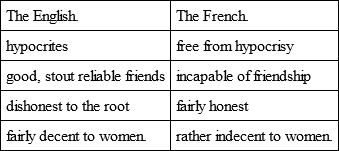
There is my table, not at all the usual one, but yes, I think you will agree with it. And by travel, each race can cure much of its defects and acquire much of the others’ virtues. Let us say that you and I are complete! You are anyway: I would not change a hair of you. The Americans hold the English faults: dishonest and hypocrites, perhaps not so strongly but still to the exclusion of others. It is strange that such mean defects should be so hard to eradicate, after a century of separation, and so great an admixture of other blood.
Your stay in Mexico must have been interesting indeed: and it is natural you should be so keen against the Church on this side, we have a painful exhibition of the other side: the libre-penseur a mere priest without the sacraments, the narrowest tyranny of intolerance popular, and in fact a repetition in the XIXth century of theological ill-feeling minus the sermons. We have speeches instead. I met the other day one of the new lay schoolmasters of France; a pleasant cultivated man, and for some time listened to his ravings. “In short,” I said, “you are like Louis Quatorze, you wish to drive out of France all who do not agree with you.” I thought he would protest; not he! – “Oui, Monsieur,” was his answer. And that is the cause of liberty and free thought! But the race of man was born tyrannical; doubtless Adam beat Eve, and when all the rest are dead the last man will be found beating the last dog. In the land of Padre d. R. you see the old tyranny still active on its crutches; in this land, I begin to see the new, a fat fellow, out of leading-strings and already killing flies.
This letter drones along unprofitably enough. Let me put a period to my divagations. Write again soon, and let me hear good news of you, and I will try to be more quick of answer.
And with the best wishes to yourself and all your family, believe me, your sincere friend,
Robert Louis Stevenson.To Alison Cunningham
The persons mentioned below in the third paragraph are cousins of the writer and playmates of his childhood; two of them, christened Lewis like himself after their Balfour grandfather, had been nicknamed after their birthplaces “Delhi” and “Cramond” to avoid confusion. Mount Chessie is a beautiful place near Lasswade: “Cummy” has described his delight when she cut whistles for him there out of a plane-tree.
[Hyères or Royat, Summer 1883.]MY DEAR CUMMY, – Yes, I own I am a real bad correspondent, and am as bad as can be in most directions.
I have been adding some more poems to your book. I wish they would look sharp about it; but, you see, they are trying to find a good artist to make the illustrations, without which no child would give a kick for it. It will be quite a fine work, I hope. The dedication is a poem too, and has been quite a long while written, but I do not mean you to see it till you get the book; keep the jelly for the last, you know, as you would often recommend in former days, so now you can take your own medicine.
I am very sorry to hear you have been so poorly; I have been very well; it used to be quite the other way, used it not? Do you remember making the whistle at Mount Chessie? I do not think it was my knife; I believe it was yours; but rhyme is a very great monarch, and goes before honesty, in these affairs at least. Do you remember, at Warriston, one autumn Sunday, when the beech nuts were on the ground, seeing heaven open? I would like to make a rhyme of that, but cannot.
Is it not strange to think of all the changes: Bob, Cramond, Delhi, Minnie, and Henrietta, all married, and fathers and mothers, and your humble servant just the one point better off? And such a little while ago all children together! The time goes swift and wonderfully even; and if we are no worse than we are, we should be grateful to the power that guides us. For more than a generation I have now been to the fore in this rough world, and been most tenderly helped, and done cruelly wrong, and yet escaped; and here I am still, the worse for wear, but with some fight in me still, and not unthankful – no, surely not unthankful, or I were then the worst of human things!


